How to Find the Right Family Therapist for Addiction Recovery

Understanding the Importance of Family Therapy in Addiction Recovery
Addiction is a complex, chronic disease that impacts not only the individual but also their family system. Effective treatment often involves family therapy, a targeted approach that improves communication, restores relationships, and fosters a supportive environment essential for lasting recovery. Finding the right family therapist is a crucial step in this process, and it requires careful consideration of qualifications, approach, and compatibility.
The Effectiveness of Family Therapy for Addiction Recovery
How effective is family therapy for addiction?
Family therapy is recognized as an important component of addiction treatment. It involves engaging family members to improve communication, support recovery, and foster a healthier environment for the individual with substance use disorder.
Research shows that family involvement can boost treatment retention, help prevent relapse, and support long-term sobriety. Family therapy programs aim to mend relationships, teach coping skills, and change harmful family dynamics that may contribute to addiction.
Evidence suggests that when families participate in therapy, individuals are more likely to stick with treatment and experience improvements in overall well-being. Types of family therapy include behavioral, multisystemic, and structural approaches, all tailored to individual family needs.
While family therapy is beneficial, it is most effective when combined with other treatments like medication and individual counseling. Support from the family can motivate the person in recovery, provide emotional stability, and help them navigate the challenges of sobriety.
Services such as SAMHSA's National Helpline can connect individuals to treatment facilities and community support groups. These resources offer confidential, free guidance in English and Spanish to help people find the right treatment options.
In summary, family therapy greatly enhances the chances of successful recovery by creating a supportive environment and addressing family-related issues that influence substance use.
Understanding the Family Model of Addiction Treatment
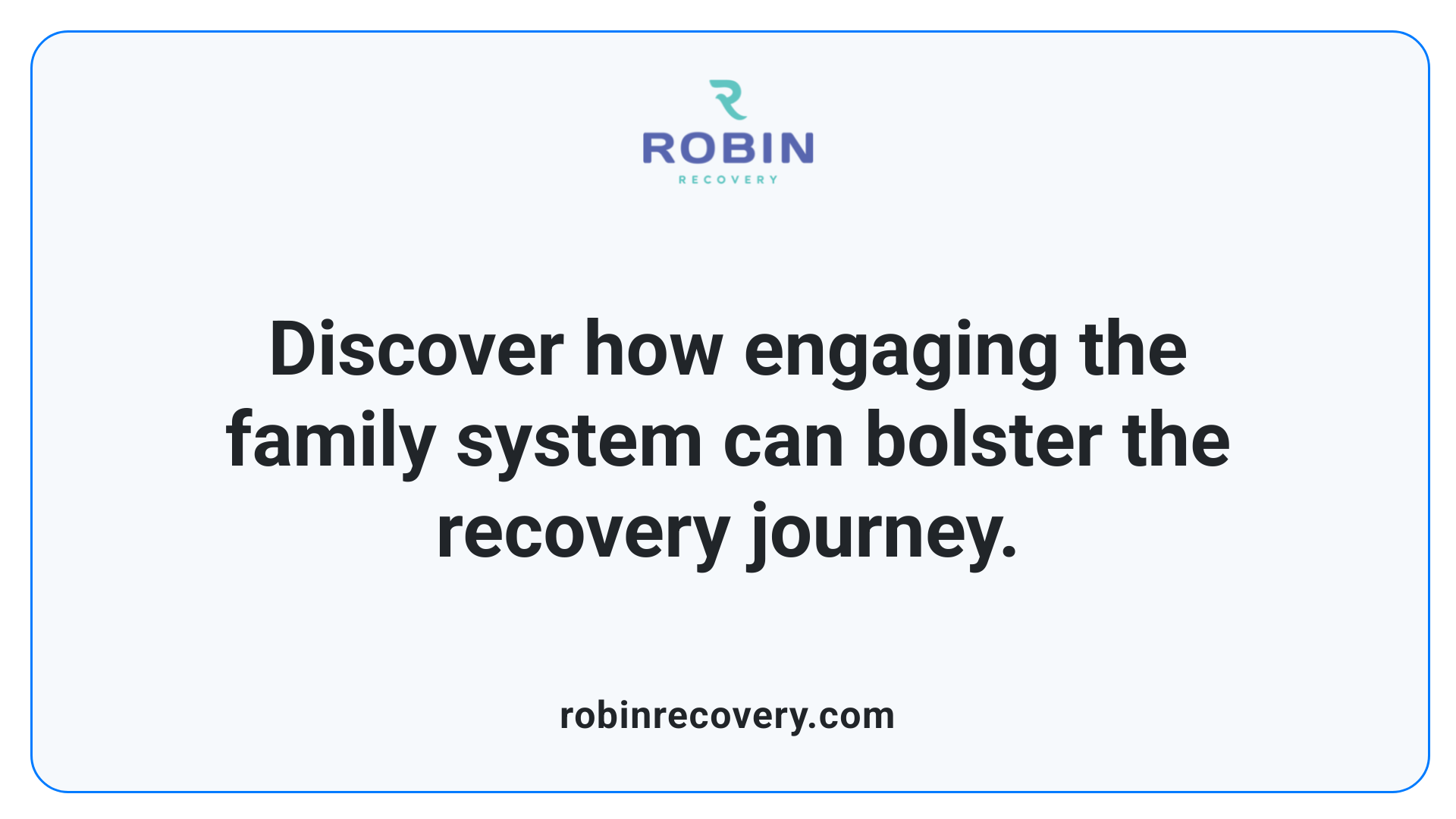
What is the family model of addiction treatment?
The family model of addiction treatment, often called the systemic family intervention, involves engaging the entire family unit in the recovery process. This approach recognizes that addiction impacts not just the individual but also their loved ones, and recovery can be strengthened through family participation.
In this model, therapy sessions focus on improving communication, fostering accountability, and building a supportive environment for the person in recovery. Treatment aims to educate family members about addiction, address family dynamics that may contribute to substance misuse, and promote a collaborative effort toward sustainable sobriety.
The systemic family intervention model in addiction treatment
This approach emphasizes the interconnectedness within family systems. Therapists work with families to identify patterns that may maintain or hinder recovery, such as enabling behaviors or unresolved conflicts. Techniques like behavioral family therapy and multisystemic therapy guide families through restructuring interactions to support positive change.
Family involvement can improve treatment retention, reduce relapse rates, and enhance overall family well-being. It often includes components like family engagement, relational reframing, and skill-building exercises to encourage assertive communication, healthy boundaries, and problem-solving.
Key principles including open communication, accountability, support, and early involvement
Successful family-based addiction treatment hinges on several core principles:
- Open communication: Family members are encouraged to express feelings honestly while listening actively, fostering trust and understanding.
- Accountability: Each member learns to take responsibility for their actions and contributions to the family dynamics influencing addiction.
- Support: Building a supportive environment helps motivate the recovering individual and provides resilience against setbacks.
- Early involvement: Involving family early in the treatment process ensures that everyone understands addiction's impact and works together towards recovery.
By integrating these principles, family-centered programs can significantly enhance the effectiveness of addiction treatment, fostering stronger relationships and long-term recovery.
Types of Therapy Approaches for Addiction Recovery
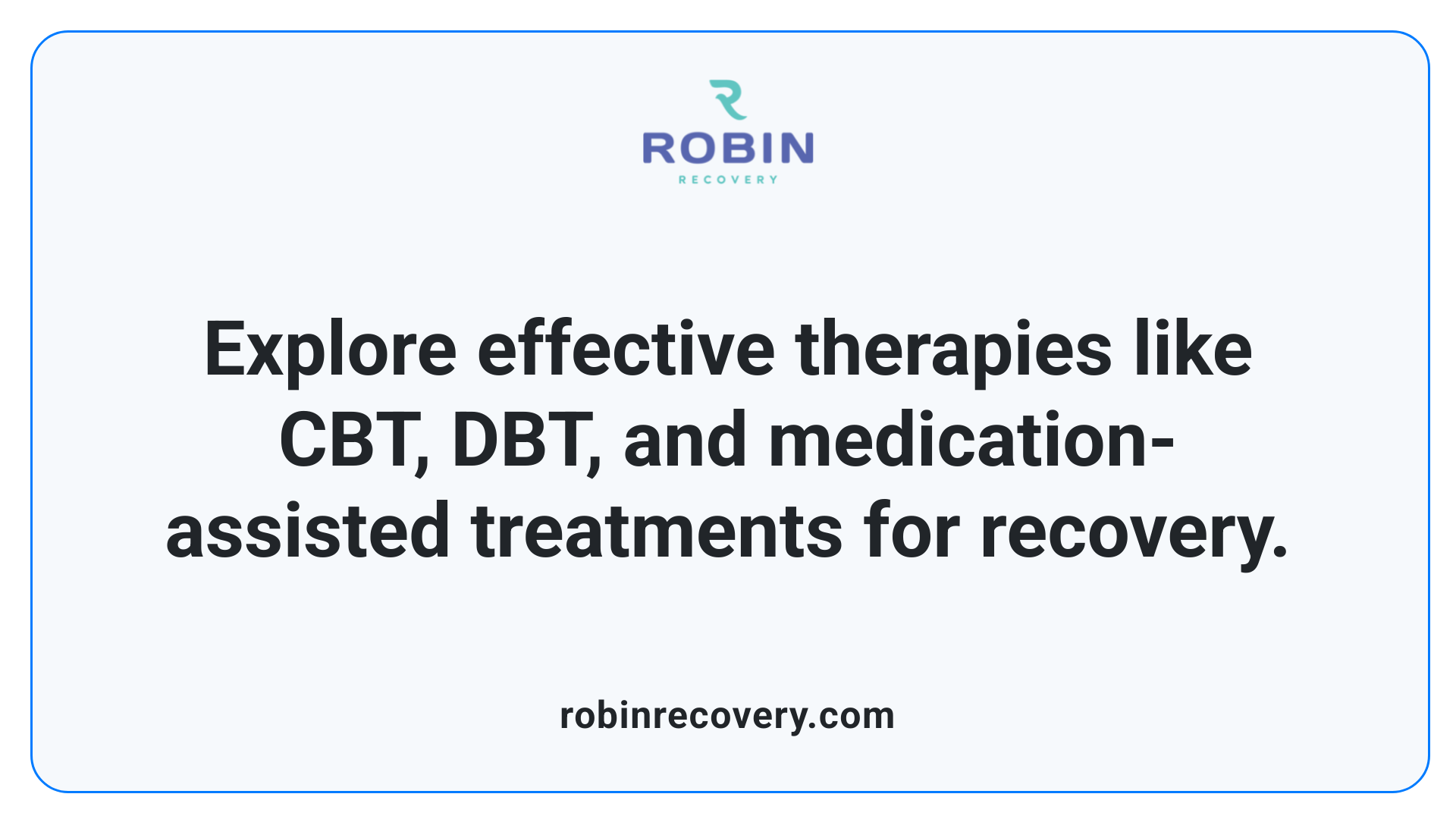
What therapy is most effective for addiction?
The most effective treatments for addiction often involve a mix of proven psychotherapy methods and support structures. Cognitive-Behavioral Therapy (CBT) stands out as a leading approach because it helps individuals recognize and change negative thought patterns that contribute to substance use. By developing skills to cope with cravings and avoid triggers, patients can better maintain their sobriety.
Dialectical Behavior Therapy (DBT) is also valuable, especially for managing intense emotions and developing mindfulness. Contingency management uses positive reinforcement techniques to encourage sobriety behaviors, rewarding individuals for meeting recovery goals.
Motivational Interviewing (MI) focuses on boosting a person’s motivation to change harmful behaviors and commit to treatment plans. Families play a crucial role, with family-based therapies like multisystemic therapy (MST) and behavioral couples therapy helping improve communication, rebuild trust, and support ongoing recovery.
In addition to therapy, medication-assisted treatment (MAT) such as buprenorphine and methadone may be incorporated to address opioid use disorder effectively. The most successful recovery plans are personalized, combining these therapies and support mechanisms to fit the individual's specific needs.
Research highlights that using multiple modalities increases the likelihood of long-term sobriety. Ultimately, an integrated approach tailored to the person’s circumstances results in the best chance of overcoming addiction and maintaining recovery.
More information about effective therapy approaches for addiction recovery:
Search query: effective therapy approaches for addiction recovery.Its efficacy is well-supported by scientific research, emphasizing the importance of personalized, multi-faceted treatment strategies.
How to Identify and Match Your Needs with Therapy Options
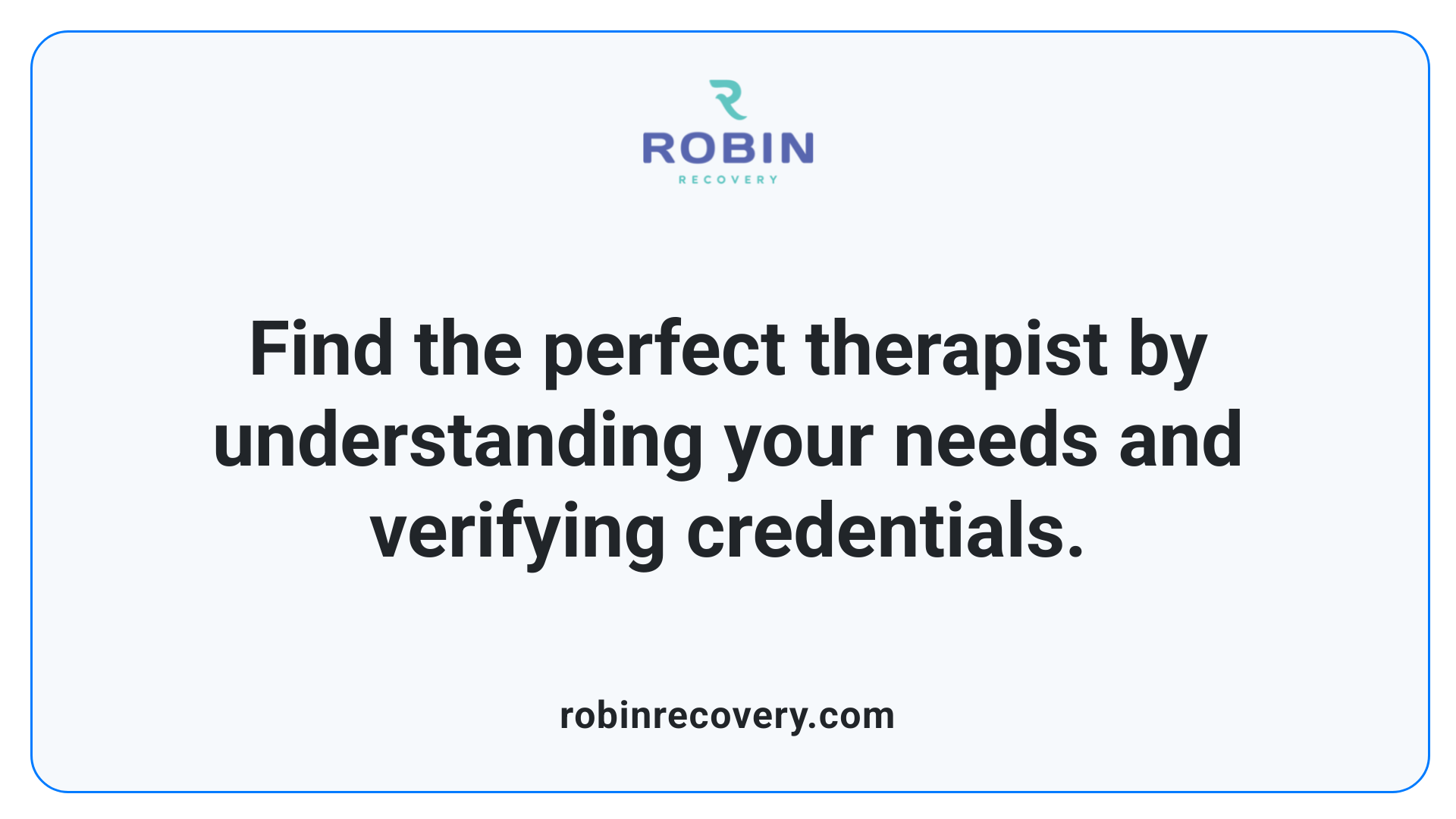
How can I find a qualified family or addiction therapist?
Finding the right therapist involves a combination of self-assessment and research. Begin by clarifying your specific needs, whether it's co-occurring mental health conditions, substance use issues, or relationship challenges. Consider what type of therapy might suit you, such as cognitive-behavioral therapy (CBT), dialectical behavior therapy (DBT), family therapy, or a combination.
Once you have a clear idea of your requirements, explore reputable sources like online directories—Psychology Today, GoodTherapy, or specialized organizations’ search tools. These platforms allow filtering by location, specialization, and therapy type. It's essential to verify the therapist's credentials, ensuring they are licensed and experienced in treating your particular issues.
When making contact, ask questions about their experience with addiction or family therapy, their approach, and cultural competence. An initial consultation can help assess comfort levels, professionalism, and whether their style aligns with your expectations. Remember, the therapeutic relationship depends largely on trust and compatibility.
Ultimately, choosing a therapist who feels right for you—someone you can communicate openly with and who understands your background—greatly enhances the chances of successful treatment. Don't hesitate to interview multiple professionals until you find the right fit, ensuring your path to recovery and mental wellness is both effective and supportive.
Practical Steps for Finding and Evaluating Therapists
When seeking mental health or family therapists, taking structured steps can help you find professionals best suited to your needs. Start by exploring reputable online directories such as Psychology Today, GoodTherapy, or specialized platforms like SonderMind, which allow filtering by issues, specialties, and location. These directories often list therapist credentials, areas of expertise, and patient reviews, providing a solid starting point.
In addition to online resources, ask for recommendations from your primary care physician, trusted friends, or family members who have positive therapy experiences. Community-based organizations and local mental health clinics also offer referrals and information about available services.
Once you have identified potential therapists, prepare a list of questions to assess their qualifications, approach, and compatibility. These questions might include inquiries about their licensing, experience with addiction or family therapy, treatment modalities, and cultural competence. For example:
| Question | Purpose | Additional Notes || --- | --- | --- || Are you licensed and what are your credentials? | Ensures professional qualifications | Look for certifications like LPC, LCSW, LMFT, PsyD, or MD || Do you have experience treating addiction or family issues? | Confirms relevant expertise | Some therapists specialize in specific populations or approaches || What therapeutic approaches do you use? | Understands treatment style | Common methods include CBT, family therapy, or motivational interviewing || How do you incorporate cultural competence? | Ensures respect and understanding of backgrounds | || Are you comfortable with virtual sessions? | Important for scheduling flexibility |
Scheduling an initial consultation, which is often offered at low or no cost, allows you to meet the therapist, assess your comfort level, and determine if their style aligns with your needs. Use this session to gauge their communication skills, professionalism, and ability to listen.
It’s recommended to try several sessions—typically 3 to 5—before deciding whether to continue. Feel free to trust your instincts; a good therapist should make you feel respected, understood, and motivated to work together. Remember, finding the right fit enhances the effectiveness of therapy and supports your recovery journey.
The Role and Benefits of Family Therapy in Addiction Recovery
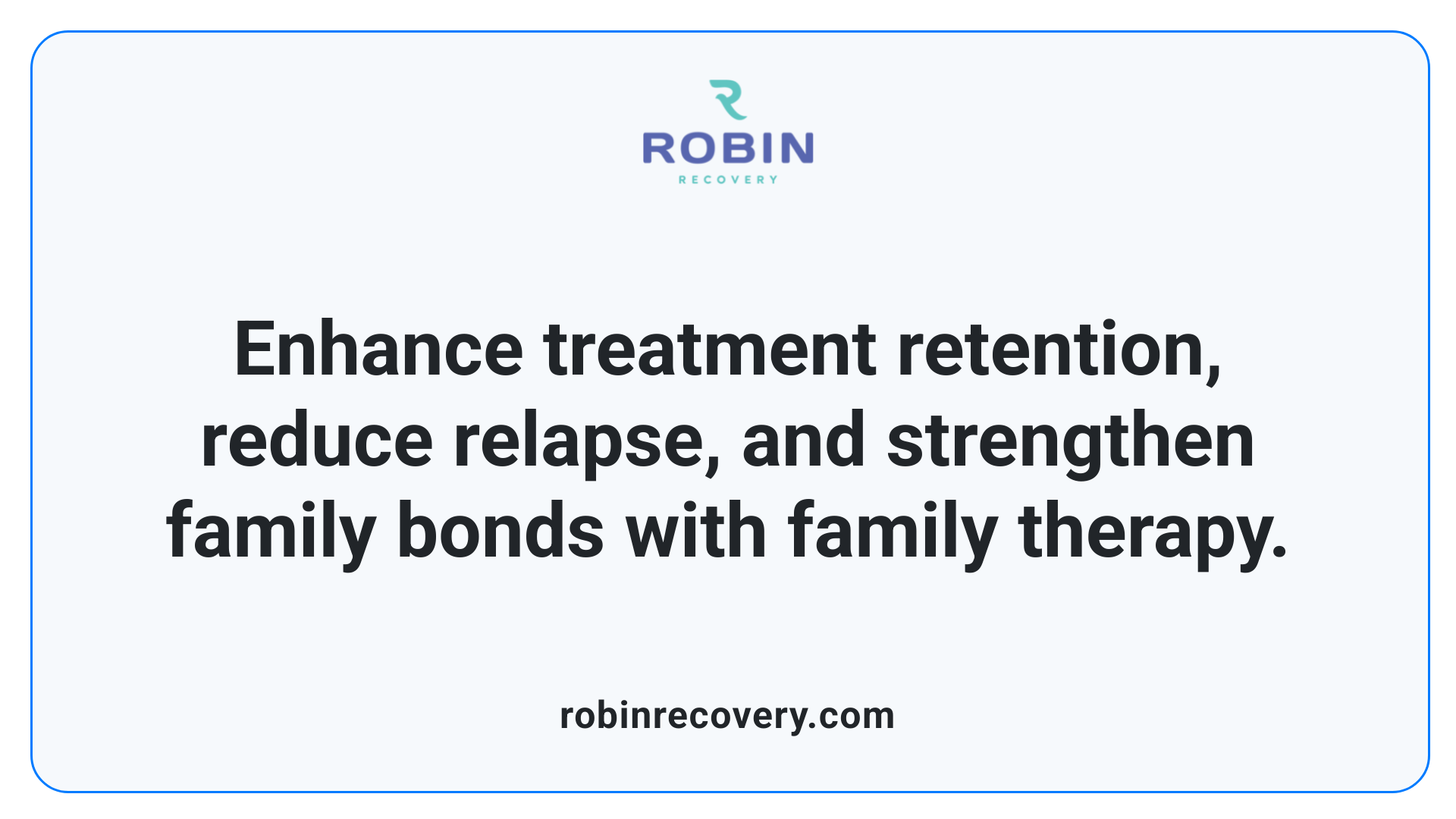
How family therapy supports treatment retention, relapse prevention, and family communication
Family therapy plays a significant role in supporting individuals recovering from addiction. By involving family members in the treatment process, it creates a supportive environment that can motivate clients to stay engaged in their recovery. Family sessions often focus on improving communication, fostering understanding, and restructuring unhealthy family dynamics that may contribute to substance use.
Research indicates that family involvement increases the likelihood that clients will continue with their treatment plans and maintain sobriety. Better communication within the family helps reduce misunderstandings and conflict, which are common stressors linked to relapse.
Additionally, family therapy enhances relapse prevention by educating family members about addiction, helping them recognize triggers, and teaching them how to respond supportively. These programs often involve strategies like behavioral skills training, setting healthy boundaries, and improving emotional support, all of which contribute to a more resilient recovery environment.
Enhancing understanding of addiction within the family context
Family therapy also aims to deepen the family's understanding of addiction as a chronic disease that affects decision-making and impulse control. It helps family members view addiction not as a moral failing but as a health condition, reducing blame and fostering empathy.
Through educational components, families learn about the nature of substance use disorders, co-occurring mental health issues, and the importance of ongoing support. This knowledge empowers family members to provide effective assistance and create a nurturing environment conducive to recovery.
Programs such as multisystemic therapy, behavioral family therapy, and structural family therapy are tailored to meet specific family needs, emphasizing collaboration and mutual understanding. Overall, family therapy is a crucial element for long-term recovery, strengthening family bonds, and supporting sustained sobriety for individuals battling addiction.
Qualities and Qualifications of Effective Therapists
What are the qualities and qualifications of effective therapists for addiction recovery?
Finding the right therapist is crucial for successful addiction treatment and recovery. Effective therapists typically possess relevant licenses, such as Licensed Clinical Social Worker (LCSW), Licensed Professional Counselor (LPC), Licensed Marriage and Family Therapist (LMFT), or doctoral degrees like PsyD or PhD. Specialization in addiction and family therapy enhances their ability to address complex issues related to substance use.
Experience plays a vital role; an ideal therapist has extensive background working with substance use disorders and understands the unique challenges involved. Compassionate, respectful, and culturally sensitive communication helps clients feel safe and understood. Therapists should adopt a collaborative approach, encouraging active participation from clients and family members.
During initial consultations, it is important to evaluate their professionalism, knowledge of addiction treatment approaches, and ability to foster a trusting environment. Reading online reviews and verifying credentials through licensing boards can further ensure the therapist's qualifications.
A highly effective therapist demonstrates empathy, patience, flexibility, and a commitment to continuous learning and self-improvement. These qualities contribute significantly to positive treatment outcomes and help clients stay motivated throughout their recovery journey.
In summary, the best therapists for addiction recovery are those who blend proper licensing, considerable experience, personal attributes like empathy and cultural sensitivity, and a collaborative attitude. This combination increases the likelihood of building a strong therapeutic relationship, which is essential for successful treatment.
Addressing Challenges and When Family Therapy Might Not Be Suitable
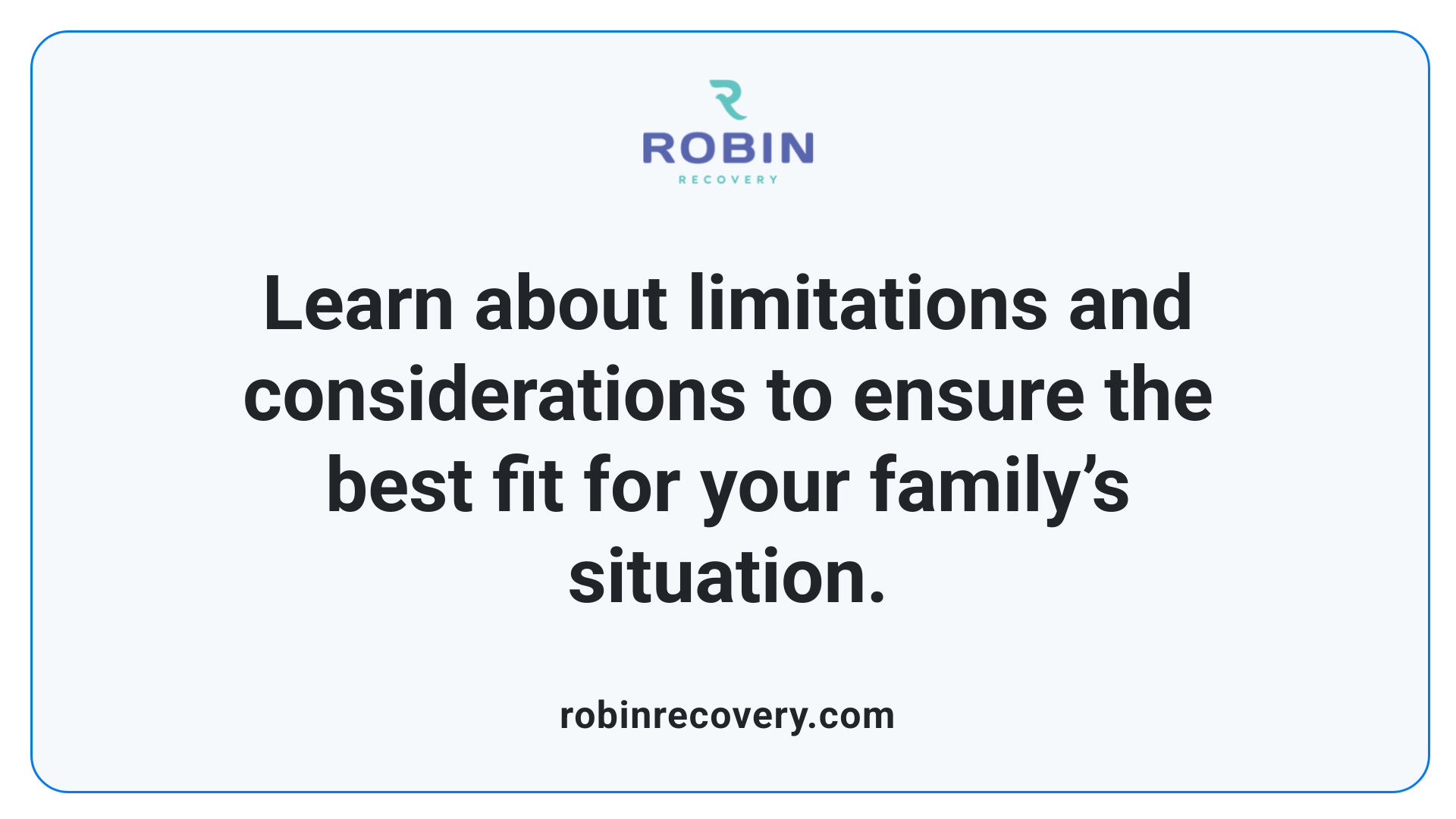
What are some considerations or limitations when choosing family therapy?
Family therapy can be highly effective for improving communication, rebuilding relationships, and supporting recovery from addiction. However, it is not always suitable for every family situation. Certain circumstances can limit the effectiveness of family counseling or pose safety risks.
For instance, a history of family violence, abuse, or ongoing conflict can make participation in family therapy unsafe or unproductive. If there is physical or emotional danger, active violence, or threats, these issues need to be addressed first through appropriate safety measures or individual intervention.
Active addiction within family members also presents challenges. When family members are themselves struggling with substance use, it can complicate the dynamics and hinder progress. In such cases, individual therapy for each person may be necessary before engaging in family sessions.
Denying the existence of a problem is another barrier. If family members refuse to acknowledge the issues or are unwilling to participate voluntarily, therapy sessions may lack engagement and impact.
In these situations, alternative approaches like individual counseling, targeted specific interventions, or peer support groups might be more suitable. These methods focus on individual needs and safety, providing a foundation for eventual family involvement.
A thorough assessment by a trained mental health professional can help determine whether family therapy is appropriate. The goal is to ensure that all involved are safe, willing, and prepared to participate for the therapy to be effective.
Supporting Long-term Recovery and Additional Resources
After completing initial addiction treatment, maintaining long-term recovery is essential. Developing a comprehensive post-treatment plan helps individuals stay on track, involving ongoing therapy, medication management, and lifestyle changes. Continued family involvement through family therapy can reinforce positive behaviors, improve communication, and rebuild trust, creating a supportive environment for sustained recovery.
Community support groups like Alcoholics Anonymous (AA) or Narcotics Anonymous (NA) provide peer encouragement, accountability, and shared experiences. These groups operate on a 12-step model, helping members develop coping skills and stay motivated.
Additional resources for long-term addiction recovery include local support networks, online forums, and educational materials about relapse prevention strategies. Finding the right community and support system tailored to individual needs can significantly increase the chances of long-term success.
Taking the First Step Toward Lasting Change
Finding the right family therapist is a vital step in supporting an addiction recovery journey that involves the entire family system. Through careful research, asking the right questions, and assessing compatibility, families can identify professionals who will foster healing, communication, and long-term sobriety. Remember that recovery is a process, and ongoing support—including family therapy—can make all the difference. Take the initiative today to explore options, and empower your family to begin or continue the journey toward health and stability.
References
- National Helpline for Mental Health, Drug, Alcohol Issues
- FindTreatment.gov: Home
- Family Therapy for Substance Use Disorders and Addiction ...
- Find Addiction Therapists and Psychologists in Connecticut
- Step 1 - SEARCH Trusted Sources To Find Providers
- How To Find and Choose a Therapist
- Family Therapy for Addiction
- How to Find a Therapist That's Right for You in Addiction ...
- How to Find a Good Addiction Therapist
- How to Find the Right Family Therapy Online
